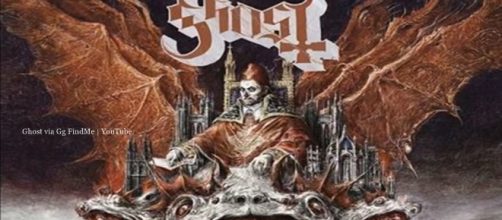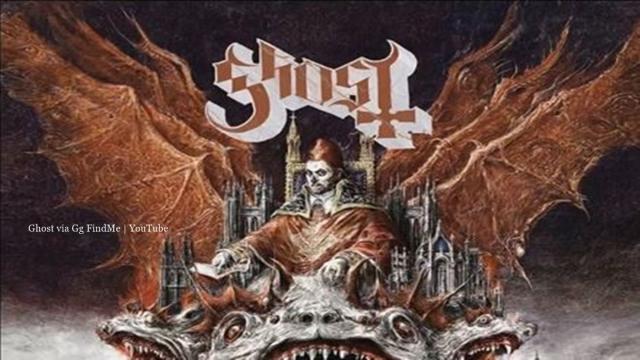Since Ghost’s emergence with their first album, “Opus Eponymous”, in 2010, the seemingly stale world of rock and metal was reignited from a new perspective. Following the years since bands such as Creed and Blink-182 made rock into nothing more than empty, radio-friendly riffs, Ghost has broken the barrier of mindless rock to revive the genre. Now, following the release of their fourth album, “Prequelle”, the band have shown no signs of stopping in revolutionising the world of metal.
Loud Wire reported this week that Blabbermouth transcribed an interview with Tobias Forge.
What he had to say about "Prequel," showed the depth of Ghost's music. "At the end of the day, one of the biggest misconceptions of Ghost is that it's just about the devil," he said. He added, "It's always been about mankind and living. Even though "Prequelle" is a record about death, essentially, it's a record about survival, and I think that that is something that's gone through all the records."
The release of the band’s latest album saw Tobias Forge, the only member of the band to not remain anonymous, return with a new alias. Abandoning his prior presence as Papa Emeritus, the frontman revealed a complete disregard for what was expected from the band, emerging as the new character, Cardinal Copia.
The album promises an unpredictable, yet recognisable sound- revealing influences ranging from Mötley Crüe to Andrew Lloyd Webber.
The themes and motivation behind the album
Centred around the morbid motif of The Dark Ages and the Bubonic Plague of 1666, “Prequelle” is rigged with ambiguity and paradoxes from start to finish. Whilst the unforgettable image portrayed by the band minimises any shock value towards the repugnant theme, the sound itself acts to surprise even the most devoted fans.
Unlike the band’s first two albums, which cannot be misconstrued as metal, “Prequelle” allows a hybrid of genres to merge, serving to generate something unheard prior to its release. Aberrance becomes apparent through the progression of the album as the distinctive sound of 80s pop is underpinned by the motif of mass infection and death; effectively keeping the band firmly at a distance from any current pop charts.
Presenting a new album of what can only be described as apocalyptic anthems, Ghost continues to intrigue listeners with a sound vaguely reminiscent of a multitude of genres, yet something that is unable to be categorised.
What the album entails
Beginning in an extremely Ghost-esque way, the album emerges with an obscure, eighty-second long rendition of “Ring Around the Rosie”. Gradually introducing synths to subtly hint at the direction of the album, the song serves to generate suspense before fading into “Rats”. Within the first two minutes, listeners are immediately thrown into the atmosphere of the album, presented with what fans know and expect from Ghost, yet teased with hints of what the album progresses into.
Progressing into “Faith”, the band remains loyal to the sound in their previous albums, presenting the most undeniably metal song on the album. With an opening riff heavily inspired by bands such as Black Label Society, Ghost reflects their own influences and allow “Prequelle” to appeal to a vast audience. One aspect prominent throughout the album is the skilful musicality of anonymous band members, The Nameless Ghouls. Nowhere is this element seen to a higher degree than in “Faith”. A thunderous bassline, complimented by a Zakk Wylde style of guitar playing demonstrates impeccable musicianship without the egocentric necessity of bragging seen all too frequently in this industry.
Whilst the first few songs on “Prequelle” promise a similar mimicking of previous Ghost albums, the transition into the first of the two instrumental pieces, “Miasma”, deliberately catches listeners off-guard.
Completely unrecognisable compared to songs such as “Rats”, the instrumental piece combines elements of 80s pop, prog rock and jazz; throwing listeners back and forth between an incomprehensible mix between Gerry Rafferty, Dream Theater and a John Hughes film. The sense of musicianship seems to intensify as the instrumental piece progresses; for the first time in their discography, a saxophone is included at the end of the song, performed by character, Papa Nihil. This diversity and range reveal the band is going one step further to show that whilst image plays a vital role, it is the music itself that defines them.
A similar case is demonstrated by the hit single, “Dance Macabre”; despite the ambiguous genre of the songs, they remain recognisable as Ghost.
By this stage in the album, it has become apparent that there is a defiant reluctance for the band to fall into the category of stagnant repetition seen by so many bands. If anything, the band show the opposite - forcing themselves to further evolve the music they merely hinted at in their Grammy award winning third album, “Meliora” (2015). The easily misconstrued chorus of the song openly mimics the cliché ballads seen in 80s pop that are generally mocked by metal. However, by incorporating theatricality and themes of the paranormal, the band was able to gather support from metal musicians such as Kirk Hammett, M. Shadows and Phil Anselmo as they released the song via their Instagram story.
Despite the band successfully both reviving their signature sound and capturing a new sound in their latest album, it cannot be said that all songs featured achieve the same effect.
Songs such as “Witch Image” seem to deflate under the pressure of the singles prior to it, serving no purpose other than to highlight the other songs on the album. On the other hand, whilst some songs fade into the background, “Pro Memoria” seems to be the reverse. An eagerness for originality demonstrated seems to be matched by an excess of lazy, uninspired lyrics that ultimately, only serves as a filler for the rest of the album.
Response from fans and overall reception
Overall, the album manages to be both loyal to Ghost’s original sound, yet simultaneously pave new ground for the metal industry. Whilst some songs act merely to provide bulk to the album and bring emphasis to other songs, it is naïve to assume that “Prequelle” has failed to captivate fans since it’s release.
With this album, Ghost has managed to achieve what few others could as they revived and revolutionised how music is perceived; defiantly refusing to be categorised and finding a unique sound, exclusive to them.
"Prequelle" is available to buy now. Ghost is playing over this weekend at the Resurrection Fest 2018, Campo de Fútbol Celeiro, Spain. Fans who get there can more than likely expect to hear some the numbers discussed in this opinion piece.



